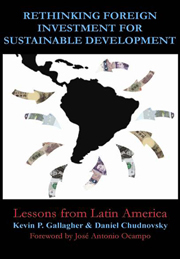Book contents
- Frontmatter
- Contents
- List of Figures
- List of Tables
- Foreword
- Acknowledgements
- Author Biographies
- Rethinking Foreign Investment for Sustainable Development
- 1 FDI and Sustainable Development in the Americas
- 2 Is Foreign Investment Always Good for Development?
- Part 1 Country Assessments
- Part 2 Political Economy of Natural Resources and The Environment
- 7 Investment Rules and Sustainable Development: Preliminary Lessons from the Uruguayan Pulp Mills Case
- 8 Foreigners in the Forests: Saviors or Invaders?
- 9 Bucking the Trend: The Political Economy of Natural Resources in Three Andean Countries
- 10 Beyond Pollution Haloes: The Environmental Effects of FDI in The Pulp and Paper and Petrochemicals Sectors in Brazil
- 11 Missing Links, Dashed Hopes: FDI Spillovers and Sustainable Industrial Development in Mexico's Silicon Valley
- Notes
- References
- Index
9 - Bucking the Trend: The Political Economy of Natural Resources in Three Andean Countries
from Part 2 - Political Economy of Natural Resources and The Environment
Published online by Cambridge University Press: 05 March 2012
- Frontmatter
- Contents
- List of Figures
- List of Tables
- Foreword
- Acknowledgements
- Author Biographies
- Rethinking Foreign Investment for Sustainable Development
- 1 FDI and Sustainable Development in the Americas
- 2 Is Foreign Investment Always Good for Development?
- Part 1 Country Assessments
- Part 2 Political Economy of Natural Resources and The Environment
- 7 Investment Rules and Sustainable Development: Preliminary Lessons from the Uruguayan Pulp Mills Case
- 8 Foreigners in the Forests: Saviors or Invaders?
- 9 Bucking the Trend: The Political Economy of Natural Resources in Three Andean Countries
- 10 Beyond Pollution Haloes: The Environmental Effects of FDI in The Pulp and Paper and Petrochemicals Sectors in Brazil
- 11 Missing Links, Dashed Hopes: FDI Spillovers and Sustainable Industrial Development in Mexico's Silicon Valley
- Notes
- References
- Index
Summary
Introduction
Over the past 25 years, Latin American governments have undertaken a structural-adjustment process including, among other actions, the elimination of trade barriers, privatization of large public domestic firms and deregulation of markets. This move towards deregulation and market reform has included a new embrace of foreign direct investment, even in the strategic oil and gas industries. Considering the former regulations and polices in this sector introduced during the nationalization wave of the 1970s, the transformation has been amazing: foreign investors have not only been welcomed but have even granted proprietary rights over extracted oil. Most Latin American oiland- gas-producing countries agreed to fix royalties at very low levels. Furthermore, the 1990s witnessed the rise of bilateralism (bilateral investment treaties (BITs) plus International Centre for Settlement of Investment Disputes (ICSID) jurisdiction), which transformed the institutional framework governing the relationship between foreign investors and host states.
Paradoxically, after a decade of market-friendly reforms and neoliberal policies, the beginning of the new millennium was marked by economic crisis, social conflict, and political turmoil.
The Andean countries (Bolivia, Colombia, Ecuador, Peru and Venezuela) are usually grouped together for analytic purposes. However, the countries on which this chapter focuses (Bolivia, Ecuador and Venezuela) share some particularities, calling for an analysis separate from the rest (Colombia and Peru).
- Type
- Chapter
- Information
- Rethinking Foreign Investment for Sustainable DevelopmentLessons from Latin America, pp. 179 - 200Publisher: Anthem PressPrint publication year: 2009
- 1
- Cited by



